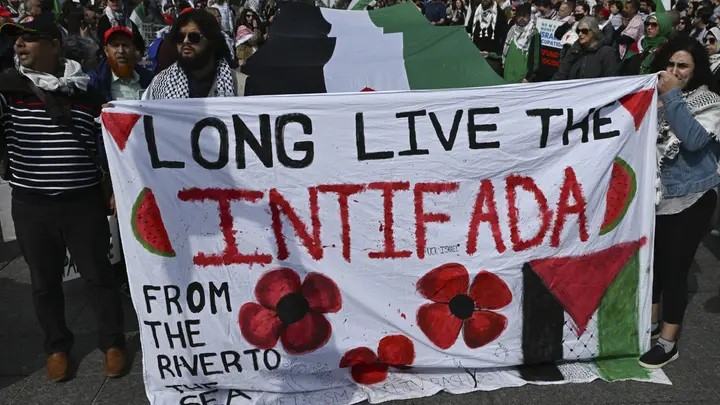Over the past six months, the chant “Globalize the intifada” has migrated from a radical fringe slogan to an increasingly visible rallying cry—heard at U.S. college campuses, protests, and even in the halls of political campaigns. What was once abstract has become concrete: violent attacks against Jewish Americans, academic threats, firebombings, and other forms of domestic terrorism cloaked in political solidarity. Ignoring this trend invites catastrophe.
From Campus Chants to Civilian Murders
“Globalize the intifada” isn’t a call for protest—it’s a call for uprising. To many Palestinians, “intifada” means uprising; to Israel—and increasingly to Americans—it means terrorism. The First and Second Intifadas left hundreds dead in Israeli cafes, buses, and schools . When that slogan crosses the ocean, it brings with it the same intent: destabilize, terrorize, dehumanize.
Consider the onslaught provoked by the slogan in real life:
-
Gov. Josh Shapiro’s home was firebombed during Passover by a man enraged by his support for Israel—chanting “Free Palestine” as he declared his intent to kill Zionists.
-
In Washington, D.C., a radical activist shouted “Free Palestine” before opening fire on Israeli embassy staff.
-
In Boulder, Colorado, a foreign national living illegally in the U.S. detonated incendiaries in a protest against Israeli hostages—telling investigators he “wanted to kill all Zionist people and wished they were all dead.”
These aren’t isolated incidents—they are part of a pattern. As Fox’s Jason Greenblatt writes: “When ‘globalize the intifada’ became normal, so did violent attacks on American Jews.”
Foreign Enablers: Iran, Hamas & Proxies
What fuels this isn’t just fringe rage—it’s coordinated hatred.
-
Hamas continues to incite and glorify violence, encouraging supporters around the world to synchronize attacks.
-
Iran, the world’s leading state sponsor of terrorism, underwrites Hamas and Hezbollah—and has made its intentions clear: “They want Americans dead, too.” Iran’s nuclear ambitions, regional destabilization, and proxy wars embolden those espousing antisemitism under “intifada” rhetoric.
-
These terror states operate like training centers: providing bloodlust, weaponry, and strategic frameworks to domestic radicals who then “do the dirty work” on U.S. soil, often self-radicalized or radicalized online.
A Pre‑9/11 Warning Pattern
We’re seeing a chilling parallel to pre‑9/11 America. In the months leading up to September 11, 2001, there were hundreds of unconnected warning signs—surveillance, unusual behaviors, small attacks, intelligence hints—yet nothing triggered a larger awareness. We allowed compartmentalization. We pretended lone incidents weren’t connected.
Sound familiar? From the New Orleans truck attack on New Year’s Eve—a rented vehicle plowing into a crowd—to a fire-based attack in Boulder months later, plus an agroterrorism scare involving a Chinese scientist smuggling a crop pathogen, a pattern of probing and testing vulnerabilities is emerging. These aren’t random anomalies; they’re deliberate probes for gaps in our homeland security.
Like the pilots who took flight lessons before 9/11 or the truck rented out to cause New Orleans carnage, the ideological groundwork for a global intifada is being laid via propaganda, funding, and tactical messages.
The Policy Response We Desperately Need
-
Redefine terror: Rhetoric that calls for intifada’s “globalization” must be recognized not as political speech but as incitement and domestic terrorism.
-
Disrupt networks: Law enforcement, intelligence, border and financial agencies must treat Iran‑ and Hamas‑linked domestic cells with the same urgency granted to transnational terror rings.
-
Track returning radicals: International students or immigrants who arrive influenced by radical curricula or militant doctrine must be monitored—and deported if they are proven threats.
-
Counter narrative: Champions of free speech must fight back with equal vigor. Bigotry must be exposed, debunked, isolated, and defunded—not legitimized.
-
Public awareness: Americans must break the habit of contextualizing anti-Jewish violence as merely “collateral” in the Israeli‑Palestinian war. These are intentionally planned attacks on U.S. citizens.
Why We Must Act Now
We face a decisive moment: either we let this rhetoric and violence metastasize, or we call it by its name—terrorism—with zero tolerance. The enemy we’re combating is marked by ancient antisemitism, spread globally by terror-states, and operationalized in attacks that echo the commemorated horrors of 9/11.
This isn’t about politics—it’s about survival. If we allow a pattern to form in which hate is plotted abroad and executed at home, we will live to regret our silence. We cannot—must not—learn the hard lessons of our past all over again.

